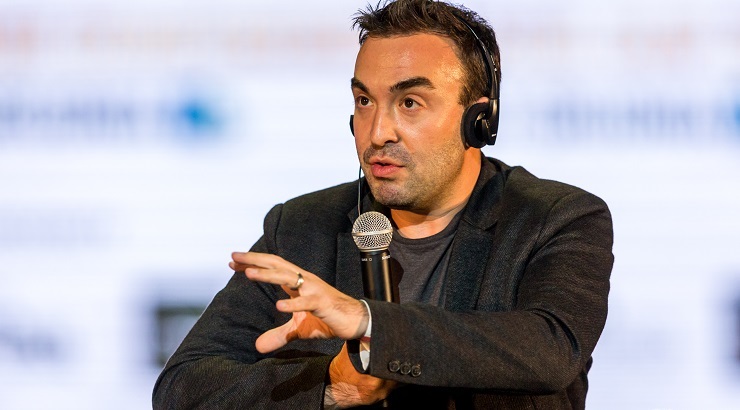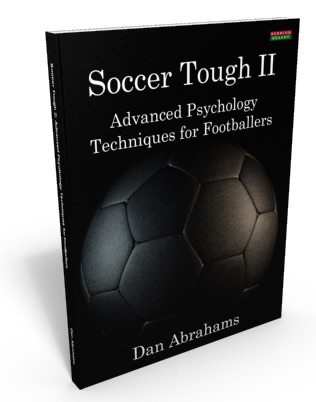When Soccer Players Practice Enough, They Create ‘Race Tracks’ for the Skill
Think of this: The connections in your brain are connected by super fast, super thick wires that help you execute the skill with ease – quicker, stronger and more intelligently than everyone else. Sound good? Read on!
SoccerToday columnist Dan Abrahams shares his insights and advice for success on the soccer field for players of all ages. A global sport psychologist and author specializing in soccer, Abrahams global sport psychologist and author specializing in soccer, Abrahams is based in England and works with professional soccer players in the English Premier League (EPL). Abrahams has helped hundreds of soccer players – many of them who play in the English Premier League (EPL) and others who play across Europe. A recent example of his work includes helping Yannick Bolasie make an enormous impact on the EPL for Crystal Palace. Abrahams has held contracts with QPR, Fulham, and West Ham among other clubs and works quietly, behind the scenes with many coaches from top clubs across Europe.

The first section of my new book Soccer Tough II asks the soccer player with ambition to become more thorough with their training attitude. I have detailed some of the ideas from the book over the past few articles on SoccerToday.
I have introduced you to the task of profiling the next level. From this I have given you ideas to build what I call a training script – a short list of the skills you are trying to improve in each and every training session. And in the last article I wrote about the importance of intentional training – training with a focused, purposeful mindset.
RELATED COVERAGE – Dan Abrahams on EVERY WORD A COACH SAYS COUNTS and SOCCER PLAYERS TAKE RESPONSIBILITY
Chapter five of Soccer Tough II was an exciting one to write. I got to explain some of the science behind effective training as well as write about one of the most successful soccer player in English football.
That player is Rachel Yankey and she holds the record number of appearances for an English international player. On 26th June 2013 Rachel lined up for England against Japan for an incredible 126th time. Such a feat is as a consequence of the work she has put in over the years. But it’s also as a result of the way she developed as a young player.
When her friends decided to join a local boys’ football club, she hatched a plan. She shaved her head and called herself RAY (an acronym of her full name – Rachel Aba Yankey.) She disguised herself as a boy to get a game of soccer.
And she got away with it for about two years – that’s how good she was as a youngster. She didn’t look out of place. She wasn’t out skilled or out muscled, she wasn’t outpaced or outrun. She experienced dozens of training sessions with boys who were physically strong and fleet of foot, and she kept up with them. Inevitably, the fact she was a girl was eventually discovered, and with her cover blown she was forced to find a girls’ team. She had to move on. But her early experiences playing with her boy mates had provided the perfect platform for a future in soccer. It shaped her game, her skills and her mental toughness.
You see, the soccer environment Rachel grew up in helped her get the very most from her ability. It pushed her to the limit. She had to do things quicker, harder and smarter. She had to look up more, take in more, and move more.
The decision she had made to play with boy soccer players had a profound effect on her career.
And this is supported by brain science. From Soccer Tough II:
Each time you learn something new you activate different brain cells and create new connections between cells. For example, cells have wired together for the time you have been playing soccer to enable you to kick a ball the way you do and to assess the pitch as quickly as you can. Essentially, the internal structure of your brain is a physical representation of your soccer ability. Your soccer brain is your soccer game! When you learn a new skill you create new connections – your brain literally changes its structure.
When Rachel used to play soccer with the boys she was furiously connecting the billions of tiny connections in her brain. And because this footballing landscape was so tough for her, the connections she was making were becoming super thick and super fast. She got better quicker! Just by striving to keep up with her peers she was upgrading her inner computer every single day.
A simple way to look at this, and something I say to my clients in the English Premier League is that it’s like trying to develop race tracks in your brain.
When you first start to learn a skill everything is slow and lethargic – you have pathways in your brain.

As you practice more so the pathways become roadways – your skills improve, they are quicker, more natural, and executed in a stronger way. Keep practicing and you create a motorway. This is when you’re very good at this skill – this is at or close to professional soccer standard.
Finally, when you’ve practiced enough, you create race tracks for the skill.
The connections in your brain are connected by super fast, super thick wires that help you execute the skill with ease – quicker, stronger and more intelligently than everyone else.
That’s a great way for you to look at your training. It’s a great way for you to look at developing your skills. You are trying to create race tracks in your brain related to all the important skills in soccer.
Of course, by setting up a training script and by engaging in intentional training, as detailed in Soccer Tough II, you give yourself a better chance to create those race tracks.
It really is true that the quality of your practice is as important if not more important than the quantity of your practice.

But as a quick tip, it’s useful to think about those race tracks being built in your mind as you train. Every repetition, with quality and with focus, that you do, will strengthen the pathways to eventually become race tracks. This makes every pass, every shot, every touch of the ball important. This means it’s your job to remain switched on at all times. It means that being engulfed in negative emotions such as frustration, despondency or anger will prevent you from building race tracks and being the best that you can be.
So in your next practice and training session go and enjoy building your race tracks. Do what England’s most capped player did – stretch yourself and train with a no limit mindset.







